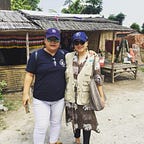Here are the tribal female heroes of Bangladesh
The Tribal Women of Bangladesh
The mountainous region in Southeastern Bangladesh, called the Chittagong Hill Tracts (CHT), borders India and Myanmar and is home to more than 11 tribal groups. Compared to the Bengalis, the majority ethnic group of the country, people here pretty much different in every way: they have their own unique languages, culture, religions, architecture, farming methods and even physical appearance.
Tribal communities are largely matriarchal, and women have much more say at their homes compared to their peers in the rest of the country. However, decades of political strife have marred the region with poverty and made life a constant struggle. And it is women and children who have had to silently bear the brunt of internal conflict.
Moving away from traditional ways of life
Locals from the CHT have traditionally practiced Jhum also known as swiden farming. In recent years, members of the tribes have been moving away from traditional farming methods, due to lack of land. However, there are still many people working as subsistence farmers, relying on rain-fed agriculture to provide for their families. In the recent years, excessive rain in the hills lead to soil erosion and landslides, creating chronic insecurity throughout the region.
“Every year, our crops are completely destroyed by rains and we barely have enough food for the year,” says Nu Hai Marma, an elderly woman. “We have to think about other ways to eat.”
Empowering women and changing lives
The Enhancing Food Security and Nutrition (EFSN) programme provides support to approximately 2,000 women, giving them a monthly allowance of US$12 for a year to cover their immediate food needs, and an additional US$178 to kick start their businesses.
“I walk for almost three hours to collect my monthly cash entitlement. With the money, I can buy enough food for my family of five,” says Marma.
With the business grant they receive, the women commonly get involved in cash crop cultivation, livestock rearing or start tailoring, handicrafts and other skill-based businesses.
“In the coming months, I can sell my goat in the local market and earn some money” she says. “This is the first time I am earning money on own.”
Female heroes in the making
U Khing Nue, King Mong Sai, and Marma are all tribal heroes of Bangladesh, who work hard to provide for their families, while contributing to the survival of their tribes through agricultural and entrepreneurship.
This programme is implemented by the Government of Bangladesh and the United Nations World Food Programme (WFP) with generous support from Canada.
